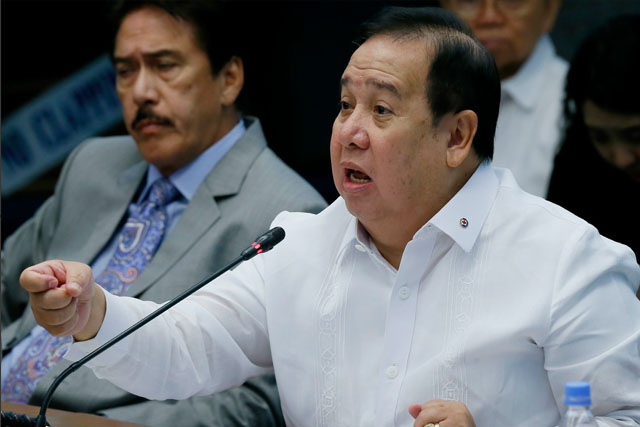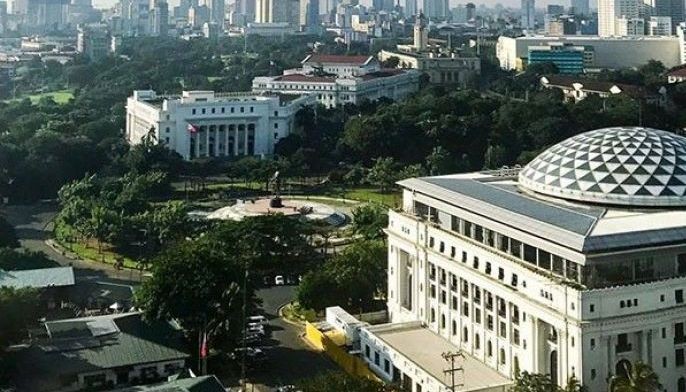Opponents question effectiveness of death penalty as deterrent

The Senate committee on justice and human rights, chaired by Sen. Richard Gordon, conducted a hearing into the planned revival of death penalty in the Philippines. AP/File
MANILA, Philippines — Opponents of the revival of death penalty questioned on Tuesday its ability to deter crimes as they branded the measure an "inhumane and cruel" punishment.
Individuals and groups against the reimposition of death penalty tried to frame their arguments in terms of its effectiveness in deterring the commission of crimes in the Philippines.
They highlighted the need for the Philippines to institute restorative rather than punitive justice as they cautioned those pushing for its revival over the weakness of the justice system that resulted in errors in more than seven in 10 cases.
Resource persons from human rights groups and some government agencies in the Senate committee on justice and human rights hearing tackled the measures intended to bring back death penalty.
Opponents cited the international obligations of the Philippines to abolish death penalty and labeled it as a "cruel" punishment.
The Commission on Human Rights (CHR) emphasized that it was not against serving justice to victims. However, according to CHR Commissioner Karen Dumpit, death penalty is far from the solution that the country is looking for.
It said that that there is no correlation between death penalty and the increase or decrease in crime rates, a point with which the Department of Social Welfare and Development (DSWD) agreed.
The CHR said that death penalty is against the "poor, uneducated, vulnerable and powerless." It also cited data that showed the danger of wrong convictions. It disclosed data that demonstrated that there was 71.77 percent judicial error rate in the country which meant that there was a high possibility that an innocent individual would be executed once death penalty was revived.
The CHR debunked arguments that that the justice system had many processes to ensure error in justice dispensation would not happen. It said that even if there were many processes the courts were still prone to mistakes because it's run by people.
Amnesty International (AI), an international human rights watchdog, also registered its opposition to the planned reinstitution of death penalty which was abolished during the time of former President Gloria Arroyo in 2006.
Branding death penalty as a degrading and inhumane punishment, AI Philippines Vice Chairperson Romeo Cabarde said it is not an effective deterrence to crime and a violation of the right to life.
Cabarde added that the Philippines could not revive death penalty because it was under international obligations which don't have an opt-out option to abolish it both in law and in practice.
The Philippines is signatory to the International Covenant on Civil and Political Rights (ICCPR) which is a key international human rights treaty guaranteeing the protection and the preservation of basic human rights such as the right to life and human dignity.
AI also said that what the Philippines is doing is against what other countries are doing as Cabarde noted that 141 countries had already abolished the punishment. This made the actions of the Philippines inconsistent with the country's international position on the matter, according to Cabarde.
The issue on the revival of the death penalty has revealed divisions in the position of government agencies. Aside from the CHR, two government agencies that went against President Rodrigo Duterte on the issue of death penalty were the DSWD and the Philippine Commission on Women (PCW).
In expressing its opposition to death penalty, the DSWD said it is "cruel, degrading and inhuman" and that there is no evidence that would prove that it is a deterrence to crime
Undersecretary Maria Lourdes Jarabe of the DSWD said the rights of criminals should not be disregarded as she noted that capital punishment is anti-poor because of the country's delayed and expensive justice system.
She said moneyed offenders could hire lawyers who could work on their cases full time unlike the poor who constitute the majority of those who were on death penalty row.
The PCW opposed the measure largely on the same grounds. According to PCW Planning Officer Maria Janica Brigola, their agency opposes the bills restoring death penalty because its effectiveness in combating crimes is questionable.
Brigola also said that death penalty was inconsistent with human rights and against the concept of restorative justice which her commission espouses.
According to her, it would be a big injustice if the country sentenced to death an innocent person. She characterized capital punishment as "irreversible."
The PCW also belied claims by supporters that it is needed because of the surging number of crimes in the Philippines. Brigola said the Philippine National Police (PNP) itself reported a plunging crime rate.
She also expressed concern that the country would have difficulties negotiating with countries where Filipinos are on death row.
Ramon Casiple, the executive director of the Institute of Political and Electoral Reforms, said that the effectiveness of death penalty is doubtful. He said that the commission of heinous crimes would not be prevented by death penalty.
He also noted a survey conducted by the Social Weather Stations that said that even if most Filipinos supported the war against illegal drugs the same number of citizens were also against the killings.
Casiple also feared that the Philippines would lose the moral ground if would reimpose death penalty especially in appealing cases of Filipinos on death row abroad.
- Latest
- Trending






























